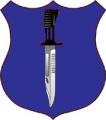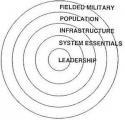It may make for a useful rule of thumb to consider that there are three basic types of lawfully constituted Armed Forces, all working together to establish, enforce, and preserve law, order, and security: Constabularies, Gendarmeries, and Militaries. Constabularies normally handle criminal matters - mainly civil matter involving little or no political component;
Gendarmeries normally handle order matters - those civil and military matters that involve a substantial internal political component; and Militaries, who handle matters with a substantial external political component.















Bookmarks